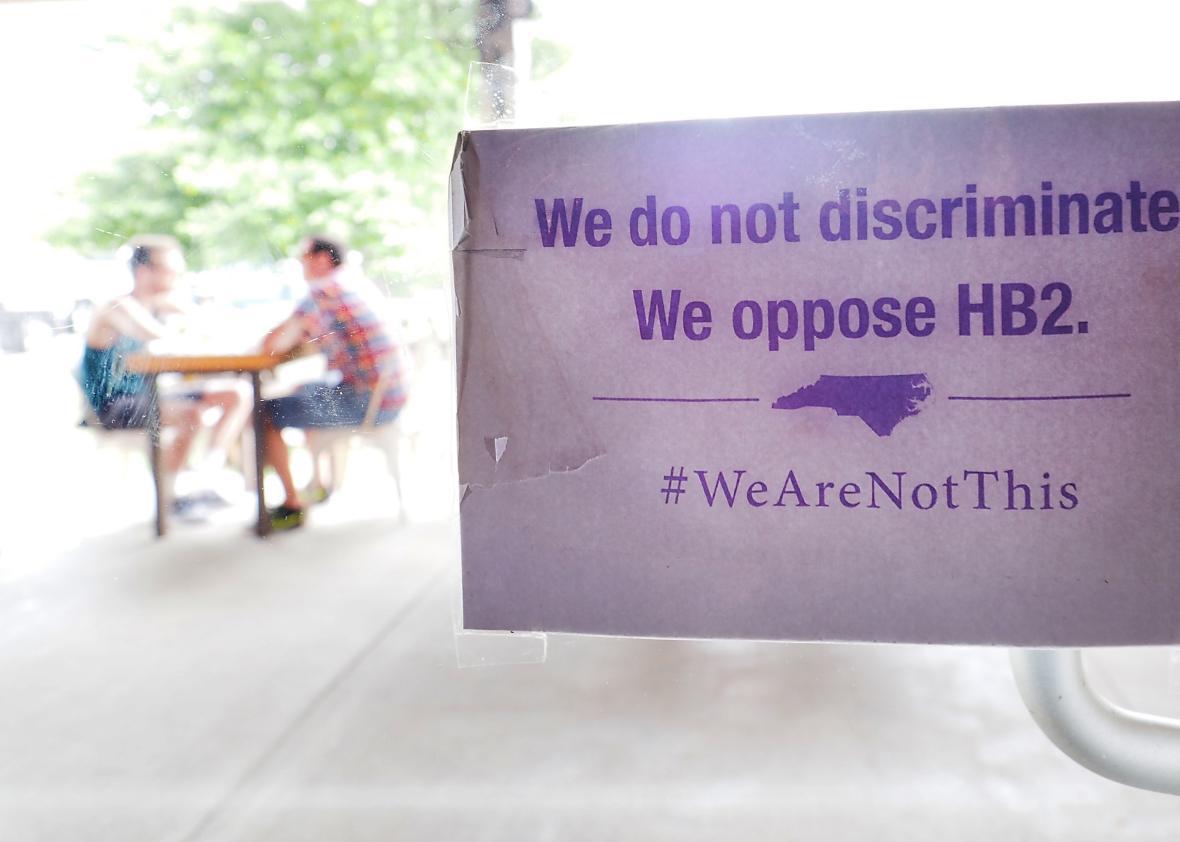Mainstream America, we hear you loud and clear: You’re sick to death of identity politics, particularly transgender identity politics.
Identity politics is a vague catch-all term encompassing every political issue that doesn’t primarily affect white, straight, cisgender men. It’s often paired with political correctness to invoke the oppressive expectation that white, straight, cisgender men should make an effort to consider other people’s feelings or take seriously issues that aren’t of immediate concern to them.
Urging Democrats to refocus on the issues that straight, white, cisgender men care about has become something of a cottage industry among the people who make their living opining. The go-to example of out-of-touch liberalism and the obsession with identity is those “damn bathrooms,” as Mark Lilla put it in the New York Times. (See also CNN’s characterization of political leaders “fussing over gay marriage and transgender bathrooms” or Rich Lowry decrying the “political hothouse” in which concern over trans bathroom access can bloom.)
Bathroom access became the most visible transgender rights issue through some alchemy of public interest, media attention, and the existence of concrete legal measures in various locales. In light of this, it may surprise readers to learn that for most transgender people, establishing the right to quietly and safely use public restrooms isn’t their top priority. It’s important, it’s a concern, and members of the trans community do share bathroom-access stories on social media and advocate for bathroom-access rights—but even more often we share stories about homicides, suicides, family and romantic partner violence, homelessness, trouble accessing health care, and difficulty finding work. We reach out to one another to find workplaces that might be willing to hire us or roommates who might not recoil from living with one of us.
Don’t get me wrong, it’s good to feel comfortable in a public restroom, but the bathroom thing is everywhere because it seems to be the only trans issue the mainstream public wants to read about. Now, in the growing backlash against identity politics, transgender bathrooms, which function as a proxy for transgender rights, have come to symbolize out-of-touchness, frivolity, and misplaced priorities.
Where does that leave trans people struggling to get by, particularly those facing homelessness, violence, unemployment, or struggling with their mental health? Nowhere good.
If we’d been allowed to advocate a little longer without the specter of a backlash looming over us, people who care about trans rights hoped that the bathroom debate would play a role in improving transgender people’s lives. We didn’t choose for mainstream America to latch onto that particular issue, but once they did, it served as a useful way of introducing Americans to trans people’s everyday lives. Photogenic middle-class trans women and men, from fresh-faced high-schoolers with abundant family support to successful professionals, could be interviewed about their modest desire to pee unmolested and unafraid and be photographed looking nonthreatening.
Soon the mainstream would come to see us as human beings with ordinary biological needs such as urination. Over many years, we hoped this view would permeate society, and fewer trans youth would be forced from their homes; fewer trans people would be murdered; poverty, drug addiction, and suicide among trans people would decrease; more trans adults would be able to find employment outside of sex work; and we would all look forward to better and more normal, integrated lives. Sure, this strategy would also mean that the trans people who needed help the most would be the last to see any gains, but it was hoped that a rising tide of acceptance would lift all boats.
But the joy mainstream America took in arguing about our bathrooms came with a risk, which was that when a backlash suddenly materialized, transgender people and their bathrooms would become a different kind of symbol. We’re now a symbol of weirdness, of too much change too fast, and of how out-of-touch liberals are with “real Americans.” Every time transgender bathrooms are invoked dismissively and with contempt, this association between caring about trans rights and being silly and out of touch grows and sets back the ability of trans people to be seen as people deserving dignity and respect.
Now straight, white, cisgender Americans have decided they’ve had enough. Enough of trans people and their desire to live with dignity. And, who can blame them? After all, they just finished allowing lesbians and gays to live with dignity—they can’t be expected to extend that right to everyone, can they? And so America is taking a much-deserved break from caring about whether or not certain groups of people are unfairly stigmatized, despised, and forced to live at the edges of mainstream society. Maybe in a couple of decades they’ll be ready for transgender equality. In the meantime, real America can enjoy the freedom to make cruel jokes at trans people’s expense without the downer of the PC police reminding them that trans people are human beings. Surely those jokes will return America to the greatness it once possessed.
